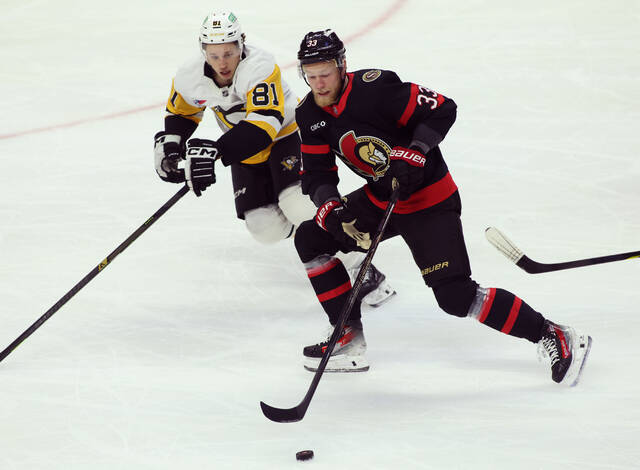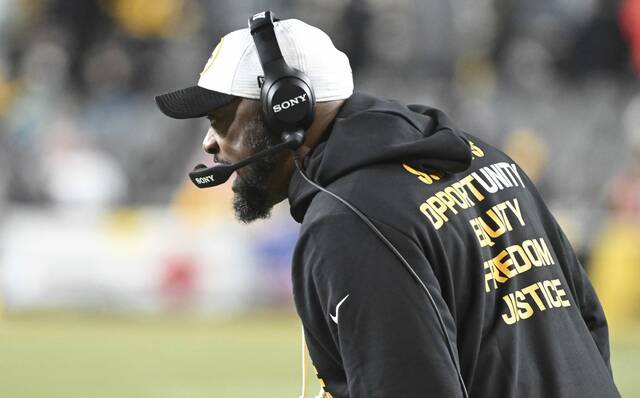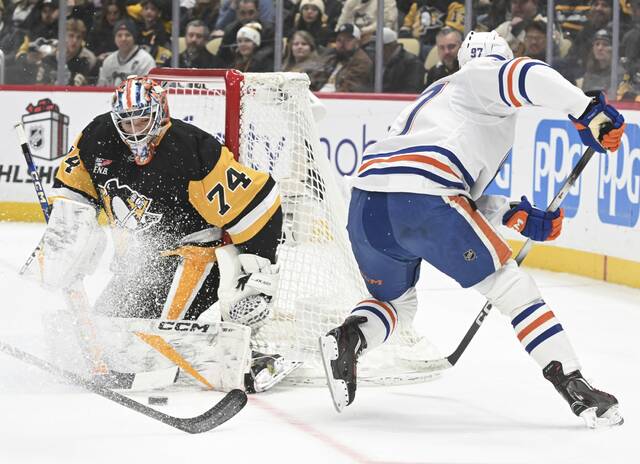Leading the Pittsburgh Penguins in penalty minutes is kind of like being the most honest guy in prison.
Someone has to be it, by default.
In the Penguins’ case, three guys are it.
The “treacherous” trio of defensemen Kris Letang, Marcus Pettersson and forward Jake Guentzel are tied for the team lead with 28 penalty minutes each.
Those aren’t exactly figures that will strike fear in the hearts of opponents.
And that’s by design.
Through Friday’s games, the Penguins were last in the NHL with an average of 6:32 of penalty minutes per game.
Through 48 games, they had grossed 314 penalty minutes. Only the Toronto Maple Leafs had taken fewer with 313, albeit with only 44 games played through Friday.
What has led the Penguins to be adverse to making more frequent visits to the penalty box?
“It’s a function of just discipline and trying to play the game the right way,” coach Mike Sullivan said. “We’re trying to be a team that plays an in-your-face game. We want to be an aggressive team. We’re a high-pressure team, as you guys know. But we’ve got to stay on the right side of the line. It boils down to the discipline of the players. They’re committed to trying to play the game the right way. And, certainly, we don’t want to be a team that takes unnecessary penalties because we put ourselves in tough spots where we give our opponents’ power plays the opportunity to be the difference.”
In essence, the Penguins’ adherence to Sullivan’s scheme typically puts them in position not to take a penalty such as a hook against an on-rushing forward through the neutral zone or interfere with a forward who is attempting a chip-and-chase sequence into the offensive zone.
“You want to stay disciplined,” said forward Brock McGinn, who is cursed with an evil eight minutes of penalties this season. “You don’t want to give (the opponent’s) power-play chances. Every power play in this league is good, and they move the puck so well. We want to do a good job of checking with our feet and not with our sticks and giving them those opportunities on the power play.”
In total, they’ve only been short-handed 116 times this season, third-fewest in the NHL through Friday.
“Without a doubt, that helps,” Sullivan said. “When you’re calling on your penalty killers to kill multiple penalties in a given night, it places a certain burden of responsibilities on those guys. It’s hard to kill penalties from a sheer physical workload standpoint. It’s hard minutes. You’re stopping and starting, you’re blocking shots, you’re in puck battles, you’ve got to defend the net front. It’s hard minutes. They’re not easy minutes. So when you’re taking lots of penalties as a team, you’re asking a lot of those guys night in and night out. Our own team discipline has a direct correlation to our ability to have success on the penalty kill.”
Not coincidentally, the Penguins boast one of the better penalty-killing units with a success rate of 87.1 %, second in the league before Saturday’s games.
“The less you’re in the box, you’re not as tired out there,” said McGinn, one of the team’s top penalty killers. “The penalty kill unit can get a little tired, and you can’t put the pressure you want on (the opposing) power play. The less penalties, the better.”
Sullivan often leans on a cliche of “being hard to play against” when describing the ideal way for his team to operate. Such a phrase might suggest to some a desire to be physical and willing to take penalties in order to rough up the opposition.
In reality, it means the opposite for Sullivan.
“One other way to be hard to play against is just controlling what you can,” Sullivan said. “Your players’ discipline with regards to their sticks and things of that nature is a critical aspect of it. I just think the players are committed to trying to play the game the right way. They’ve done a great job in that regard.”








